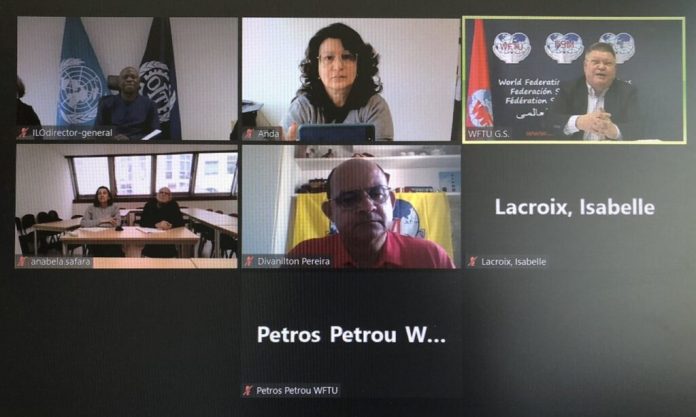The WFTU GS and the ILO DG discussed issues of common interest, focusing on the challenges faced by workers all over the globe, and the role and functioning of the ILO. The WFTU and ILO will continue their collaboration and coordination.
The WFTU General Secretary in his intervention:
Thank you for your kind response to our request for this meeting.
First all, we would like to wish you again, face-to-face this time, a creative tenure in the important post you have assumed. It is a great responsibility, but also the satisfaction will be huge, if the action of the organization you have assumed the leadership, led in the protection and improvement of the working and living condition of the billions of workers all over the world.
Mr. General Director.
The crisis that the Global Economic and social system is going through is deepening and its effects are shouldered on the workers and in general on the popular strata. Inflation brutally undermines the standard of living of workers.
Social inequalities are dramatically increasing.
The ILO slogan for “decent” work sounds nice. But it does not reflect, not even in the slightest, the current reality of the living and working conditions of employees. The work is dignified only if is work with rights, is regulated by a collective agreement, and at least ensures the satisfaction of the modern needs of those who work. If there are health and safety conditions at work free public education and healthcare for all, dignified life for pensioners and the elderly, and possibilities of creative and quality free time.
Unfortunately, this is not the reality for the vast majority of the working people. The neo-liberal attack of the last decades on the pretext of “competitiveness” and “freedom of market and commerce” and capitalist globalization with the terms that are launched, increasingly tend to deregulate labour relations and turn work into a common commodity that is sold and purchased without any regulation and protection by agreements and employment contracts which are the result of collective bargaining.
Within these circumstances, we believe that the ILO has an important role to play; important role in the protection of the economic, social, and trade union rights of workers who despite being the vast majority of human society, it is obvious that they are the weak group in the social tug-of-war.
We regret to note that in practice this role today is not so distinct. I think it is unfortunately recognized by everyone that in recent decades at the global level, the role of collective bargaining in shaping working conditions has been significantly reduced.
The devastating and undermining of collective agreements with personal contracts, the continued promotion, and legalization of the so-called “flexible” work forms, privatizations, outsourcing, teleworking, and cancellation of labor rights through the so-called “services lease” are some forms of attacks against labor rights and collective agreements.
It is obvious that the ILO conventions set up to protect the right to organize and collective negotiation, are now in many cases merely cosmetic. In some other cases, they are undermined by the continuous slide in practices of replacing the essential collective bargaining with a flabby and suspicious “social dialogue”, which in most cases is made to legitimize pre-judged decisions.
We have already given to the transition team in our meeting last September a written document with our Federation’s position regarding industrial relations as they stand today and the role, we believe the ILO should play in order to respond to the expectations and demands of the workers.
I hope that, as a new DG, you will study them carefully and take them seriously into account.
On the occasion of this meeting, we also want to raise another issue which we consider to be an important matter of principle.
WFTU is the oldest World Trade Union Organization with a continuous, lasting presence in the structures and action of the ILO for almost 8 decades. It has its stamp on all the important Conventions which established the post-war physiognomy of the ILO and of industrial relations.
However, we regret to note that nowadays our Federation and its affiliates face unacceptable adverse discrimination based on political and ideological criteria. Although the WFTU represents over 105 million workers from all continents, the ILO’s structure of governing bodies excludes us almost completely from both participation in governing bodies and the general functioning of the organization.
And it is a tragic irony that an organization that has been founded to promote participation and dialogue, operates without applying these principles in its functioning.
Fair and equal treatment of the WFTU within the ILO’s functioning is not a request, it is a demand, and we expect you as the new Director-General to address this demand in a fair and constructive spirit.
The WFTU, as it did in the past, will remain creative, with positions and proposals, but at the same time will remain militant and decisive for the rights of workers against any form of exploitation.












